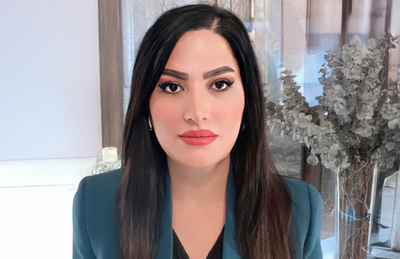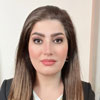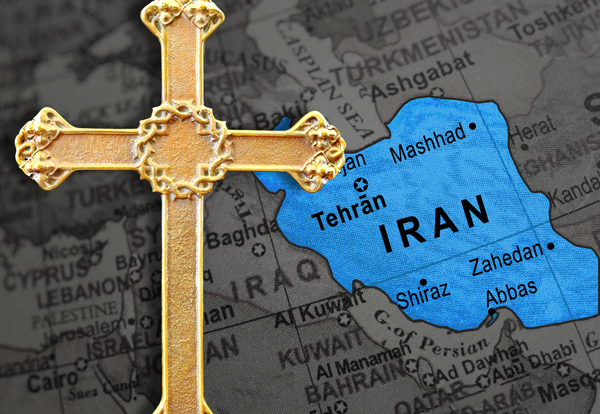Introduction by IPT Executive Director Steven Emerson: "Yesterday, July 8, the IPT republished a very important analysis of the dynamics and the still-unfolding repercussions in Iran of the 12-day Iran-Israel war. Today we bring you an interview with the author of that piece, Ms. Shukriya Bradost, who stands out as one of the most original thinkers on Iran today."
 Photo credit: Shukriya Bradost |
Shukriya: My friends and I established the first 'Women, Life, Freedom' committee in Iran in 2003, when we were high school students in Urmia—a city in the Kurdish region of Iran and what is now considered part of Generation Z. This background reflects the long-standing resistance of people in this region against the Islamic Republic and how the struggle has been passed down through generations. In 2022, the slogan 'Women, Life, Freedom' gained national momentum and became the leading cry of the Iranian uprising. It was profoundly moving to see how a message we had championed for years could finally resonate with a broader audience across the country.
Steve: For our readers, which uprising are you referring to?
Shukriya: The uprising began after a young Kurdish woman, Jina Mahsa Amini, died in police custody in Tehran in September 2022. She had been arrested by Iran's 'morality police' for allegedly violating the country's mandatory hijab laws. Protests first erupted in her hometown of Saqqez, in Iran's Kurdish region, and quickly spread across the country, condemning her death and the broader repression by the Islamic Republic.
Steve: What happened?
Shukriya: They tried to arrest me, but I escaped from Iran through the mountain, from Iranian Kurdistan to the Iraqi Kurdistan region. This was in 2004.
Steve: And what was that like personally?
Shukriya: That's a good question. At the time, there was a low-intensity conflict between Iranian Kurdish armed groups and the regime's forces along the border. Around 2004–2005, Kurdish forces launched another wave of armed resistance, and the Iranian regime responded with heavy bombardments. Crossing the border during this period was extremely dangerous.
This occurred in the context of a renewed ethnic uprising in Iran, following the earlier wave of Kurdish resistance that was crushed in the first years after the 1979 revolution. The reformist government of President Khatami, elected in 1997, had promised meaningful political reforms, including for ethnic minorities. This earned him widespread support among Kurds, Baluch, and other marginalized groups. However, his government ultimately failed to deliver on these promises.
Since then, the regime has used ethnic demands as a political tool—mobilizing minority communities during elections with promises of inclusion, only to ignore or suppress their demands once the elections are over.
Steve: Can you elaborate for our readers? Did he actually foster a real reform movement, or was that a fiction?
Shukriya: The reformist movement under Khatami was designed to rescue the Islamic regime at a time of growing dissatisfaction, especially after the Iran-Iraq War. While it briefly opened space for media and public discourse, it quickly failed—the regime's structure blocked any real change. This experience showed that meaningful reform is impossible without fundamentally changing the regime itself
Steve: And what was the final result? How long did it last for, and how many people were killed or arrested?
Shukriya: We don't have an exact number of those killed or arrested, but the killing of Shwana Ghaderi in July 2005 sparked a major wave of protests across the Kurdish region. He was arrested by Iranian forces in the city of Mahabad and died under torture. In a horrifying act meant to terrorize the local population, his body was tied to a military vehicle and dragged through the city center. Rather than silencing dissent, this brutality fueled widespread outrage, leading to protests in many Kurdish cities. The protest went on for several weeks, with a dozen people being arrested in the Kurdish region. The link for this protest:
Steve: I don't recall that it got a lot of coverage outside of Iran. Is this a regular problem when it comes to Kurdish protests?
Shukriya: Unfortunately, when it comes to Iran, the struggles of ethnic groups—like the Kurds—rarely receive much attention or coverage from the outside world. Kurdish activists tried to document and raise awareness about what happened, and some international human rights organizations, like the Human Rights Archive, recorded it. So it exists in human rights circles. But if you're asking about international media coverage, no, I don't recall it getting much attention. Even within Iran, other parts of society largely remained silent. In fact, when it comes to the Kurdish issue, much of the population has either ignored it or sided with the regime.
Steve: What's the next phase in the internal arena of Iranian politics? Take us to 2009 which some have coined as the "velvet revolution.'" What instigated it?
Shukriya: The 2009 "Green Movement" began after millions voted for reformist candidate Mir Hossein Mousavi, but the regime declared Ahmadinejad the winner. It was widely seen as a stolen election—what many called the peak of Iran's election engineering. Since then, public trust in elections has collapsed. The regime has used similar tactics beyond Iran, including in Iraq, where, for the first time in 2021, Iran-backed militias lost after restrictions on foreign interference.
Steve: At the time, in 2009, President Obama had refused to support the revolution or at least any type of protest. So was that something you were conscious of at the time? Was there an effort to try to get the US to support it or at least to get logistical help?
Shukriya: Actually, yes, at that time, people were chanting a clear slogan directed at Obama: "Are you with us or with them?" It was a powerful moment that many still remember. Just last year, Obama admitted he made a huge mistake by not supporting the Iranian uprising in 2009. He said he was given bad advice and misread the situation. So, he acknowledges that the lack of support was a significant error.
Steve: And what was the end result of that rebellion?
Shukriya: Definitely, it ended with a brutal crackdown. The protests surprised many and had the potential to lead to regime change, even though reformist leaders didn't openly call for that. The people were demanding reform, not a full overthrow, which is why it's called the Green Movement. It was more a movement for change than an outright rebellion.
Steve: Can you give our readers the best assessment of the breakdown in Iranian society between the ultrareligious and the secular? From afar, we see the ubiquitous images promoted by the regime of women covered head to toe with the chador chanting "Death to Israel, Death to America."? What percentage of the Iranian street do they represent?
Shukriya: At that time, the 2009 protests were the largest in Tehran since the 1979 revolution, with more people on the streets than even regime-organized rallies. This showed widespread demand for change. Those who support the ultrareligious regime and its strict Shia ideology are a minority. Until 2009, many believed elections could bring change, but the rigged election crushed that hope, demonstrating that the regime controls the outcome regardless of votes.
Steve: I know that the Kurdish population of Iran has been on the disproportionate receiving end of the mullahs' draconian crackdowns. Can you give us a more detailed look at how the Kurdish areas are governed and how Tehran imposes its will on the Kurdish populations? Is the regime able to recruit local Kurds to serve in the IRGC?
Shukriya: The Iranian regime governs Kurdish areas through a form of internal colonialism, controlling the region militarily and exploiting its resources without political power-sharing or investment in development. Since 1979, the Kurdish region has been heavily militarized with the largest deployment of Iranian forces. The regime also dehumanizes Kurds through media propaganda. Recruitment of Kurds into the IRGC is limited due to deep mistrust—they are seen as unlikely to be loyal to a regime that has oppressed their families for decades. Almost every Kurdish family has at least one member who has faced imprisonment, repression, or death.
Steve: Can you elaborate?
Shukriya: The regime has long used media to portray Kurds as less than human to justify repression. For example, an Iranian pilot who bombarded Kurdish areas once appeared on national TV and made horrifying comments about eating human meat, normalizing brutal stereotypes. This kind of propaganda has persisted for decades, fostering hatred and justifying harsh crackdowns.
Steve: Let me jump to the article of yours that the IPT republished yesterday. I found your analysis of the effects of the Israel/Iran war to be refreshingly different from media's tired, cookie cutter analyses. I couldn't distinguish between the Teheran Times and views presented by CNN, the Washington Post and the permanent class of totally disqualified Secretary of State wannabes. They alleged that the Iranian street became unified in the regime's pathological hatred of Israel who the Mullahs have been vowing to annihilate from the moment they took over. But I think your reporting shows that they got this wrong. How so?
Shukriya: Thank you for your kind words about my writing. What's interesting is that many Iranians today feel betrayed by the US and Israel, not because they support the regime, but quite the opposite. They desperately wanted Israel and the US to finish the job of overthrowing the regime. Their fear was that if the regime wasn't removed, they would face violent reprisals. Their message was essentially, "How could you not finish the job and leave us exposed to the regime's murderous backlash?"
Steve: You know of course that the Israelis were embarking on a series of follow up raids that intended to permanently destabilize the regime to make it easier for the population to overthrow these tyrants. But the Israelis never had the chance to carry out this mission due to the cease fire. Do the Iranians understand this?
Shukriya: Yes, that's exactly how many Iranians see it. They even express frustration toward Trump, asking why he stopped Netanyahu from finishing off the Islamic regime, because they believe that was the only way to be free from its oppressive control. However, there's a problem: the regime is deeply wounded but still dangerous. On the very first day after the ceasefire, they executed three Kurdish people accused—likely falsely—of being spies. The regime now uses such accusations to justify arresting large numbers of activists.
Steve: And can you tell me what is going on in Iran today?
Shukriya: Even today, many activists continue to be arrested. There's a shift in the accusations compared to before. Previously, people were arrested simply for opposing the Islamic regime, which was equated with standing against God. Now, following the recent war, activists are being charged not only with opposing the regime but also with supporting Israel in the war against the Islamic regime. This new accusation adds another layer to the repression.
Steve: How many Iranians have been arrested?
Shukriya: Last time? More than a thousand. Right now. The first day, even the first day after the ceasefire, 700 until now, a thousand have been arrested.
Steve: And is there a breakdown of who's been arrested?
Shukriya: Yes, most of those arrested are from the Kurdish region. Kurds are an easy target for the regime. Meanwhile, the majority of the regime's intelligence leaks come from within the regime itself, particularly the IRGC structures.
Steve: And who has been executed?
Shukriya: So far, the confirmed number of executions is three. There is another Kurdish individual who has received an execution verdict under the same accusation of working with Israel. He was arrested during the 2022 Women's Life Freedom uprising.
Steve: Can you explain the conditions that enabled Israel to infiltrate and penetrate nearly every level of the security and religious establishment of Iran?
Shukriya: I explain it through Sun Tzu's war strategy: to defeat your enemy, you must penetrate the core of their power and exploit their weak points from within. Israel succeeded because it identified internal fractures inside the IRGC, particularly the power struggles over limited financial resources under sanctions. When commanders fight over shrinking funds, it creates distrust, rivalry, and openings for infiltration. Israel didn't need a large military campaign; it struck the regime's core from inside, eliminating top commanders in under 30 minutes—a major intelligence success.
Steve: Thank you for spending the time with us.
 Shukriya Bradost is an Iranian Kurdish analyst and PhD researcher in international security at Virginia Tech, specializing in Middle East security, non-state actors, and the securitization of ethnic groups in Iran. Shukriya frequently shares her insights on international and Middle East security issues through prominent media outlets such as BBC Persian, I24, VOA, and Iran International TV.
Shukriya Bradost is an Iranian Kurdish analyst and PhD researcher in international security at Virginia Tech, specializing in Middle East security, non-state actors, and the securitization of ethnic groups in Iran. Shukriya frequently shares her insights on international and Middle East security issues through prominent media outlets such as BBC Persian, I24, VOA, and Iran International TV.
Copyright © 2025. Investigative Project on Terrorism. All rights reserved.



 IPT Series on Christianity in the Middle East: Persecution of Christians in Iran, Part One
IPT Series on Christianity in the Middle East: Persecution of Christians in Iran, Part One